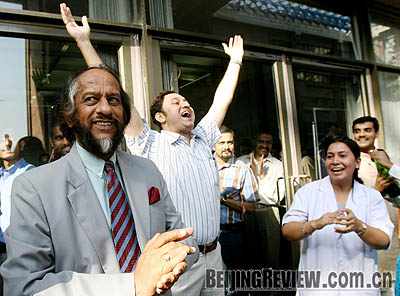|

"India's stance has always been that before any pressure can be applied, before any commitment is accepted by India, developed countries have to take action."
--Rajendra K. Pachauri (left), 2007 Nobel Peace Prize Laureate
Beijing Review: The average amount of resources and energy consumed by developed countries is much higher than those by developing countries. To be more efficient in energy conservation, which should bear the bigger responsibility?
Rajendra K. Pachauri: I think the first steps must be taken by the developed countries for the reasons you mentioned. Unfortunately, if you look at what has happened since 1992, when the UN Framework Convention on Climate Change (UNFCCC) came into existence, the record of action by the developed countries has not been very inspiring. I believe they have to take the first steps. But the developing countries, for a variety of local and national reasons, should also take urgent measures to save energy and use energy efficiently.
Will people come to the conclusion that the developed countries have damaged the climate in their efforts to industrialize and that developing countries will do the same?
It's to our benefit to use energy as efficiently as possible and reduce our dependence on fossil fuels. But at an international level, we've got to push the developed countries to take the first steps, because it is clearly written in the UNFCCC. But one should not wait for the other.
In the last 50 years, most of the changes in climate have taken place largely because of human actions. We cannot predict how nature will act in the future, but we know with human actions we are causing climate change, which will have very harmful effects.
Some countries are developing biofuels. Is that a good example?
People can develop biofuels, but they should not be based on food crops, as some countries are doing. I think that is a terrible mistake. There are several other options. You can produce biofuels that do not conflict with food production.
What is India's stance on climate change policies?
India's stance has always been that before any pressure can be applied, before any commitment is accepted by India, developed countries have to take action.
Some athletes are complaining about the air in Beijing. As an international citizen who has been living in Beijing for many years, what are your comments?
The Beijing Municipal Government is spending a huge amount of energy to clean up the air and the environment. I cannot predict how far this can go by the time the Olympics begins. We did a joint audit with the Beijing Olympics and the International Olympic Committee. Actually, we are giving a lot of good marks to the work of the Beijing Government in getting to a clean air environment. I think the quite complicated matters have much politics behind them. Fundamentally, we hope that the Olympics is a sports event that brings people together. Certainly, I will be there.
What can be done to curb the air pollution in Beijing?
There is much more construction going on in Beijing than in the whole of Europe. In the next few months when lots of the building projects are completed, there will eventually be a breeze of fresh air. Another challenge for Beijing now is that the number of cars owned by individuals has grown dramatically in the past years. I think that's something Beijing must deal with. There are efforts to expand the subway system. I think public transport is the key to resolving the emission problem.
Bad news for auto companies?
Ownership of cars is one thing, but usage of them is another. People who used to drive 100 km a day can drive 10 km a day. I talked to Volvo Chief Executive Officer Leif Johansson. Volvo is a major car manufacturer. It is now focused on public transportation systems.
Any other solutions to curbing urban gas emissions?
Part of the problem is how the cities are designed. There is a city center, and people will need energy to drive back and forth. In the future, as a more sustainable idea, for instance, we can put people and work closer together. We can think of these ideas that will make life much more interesting and valuable. | 